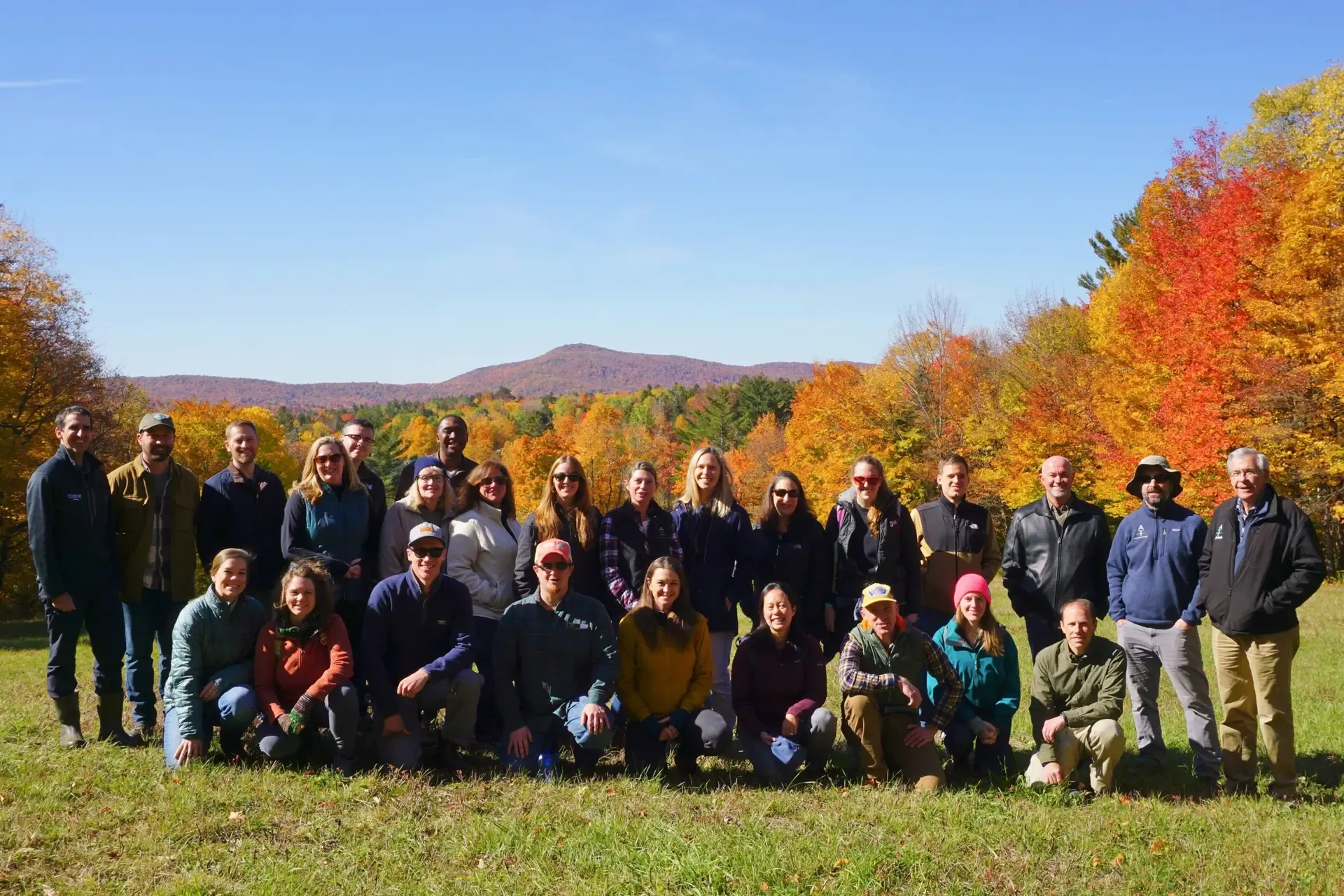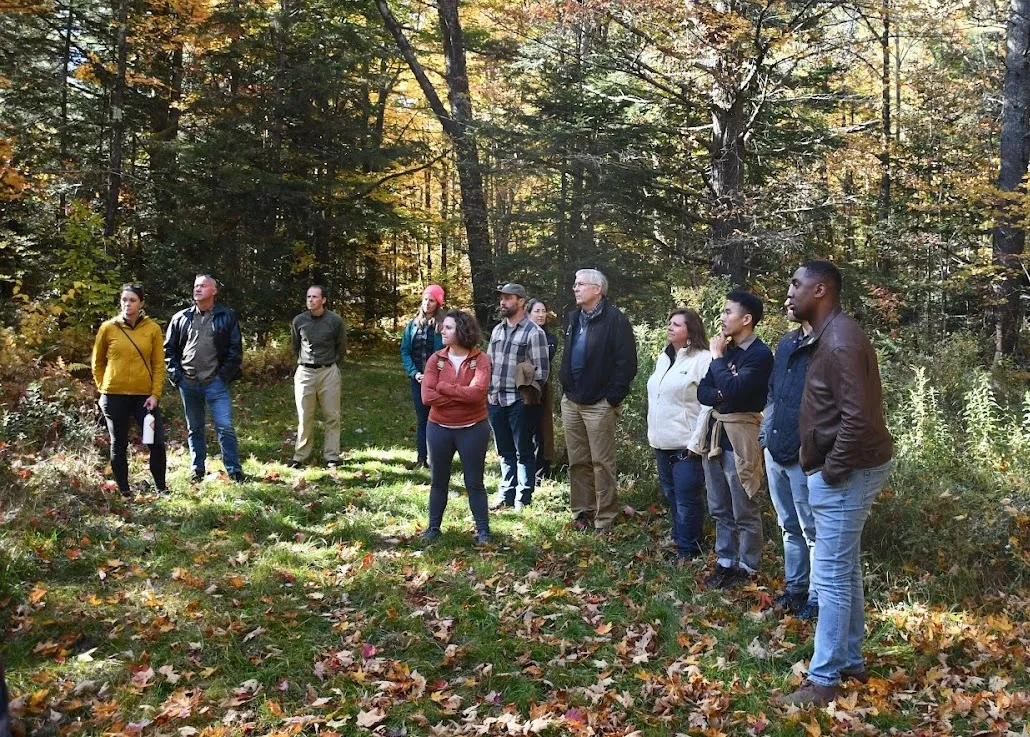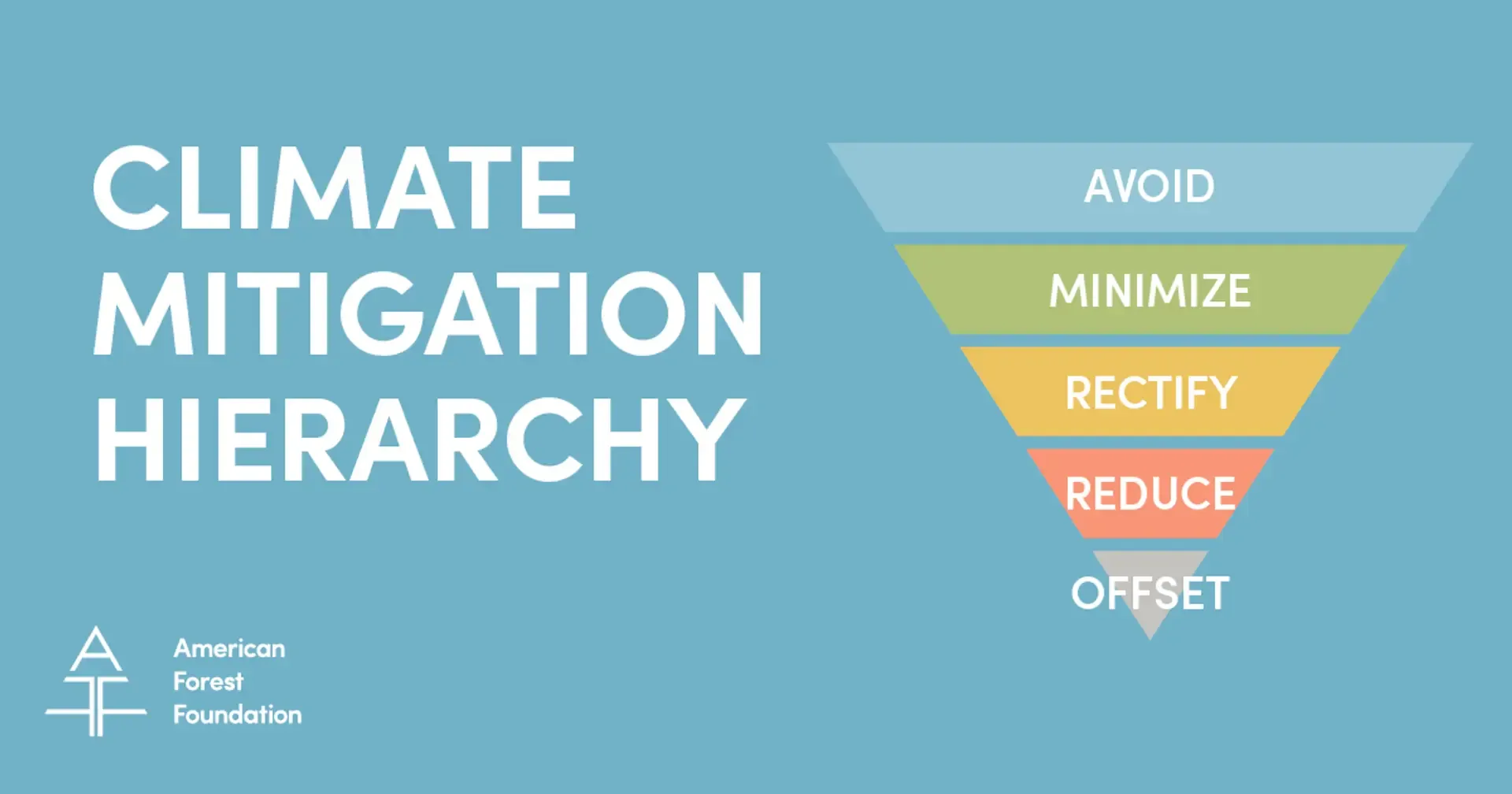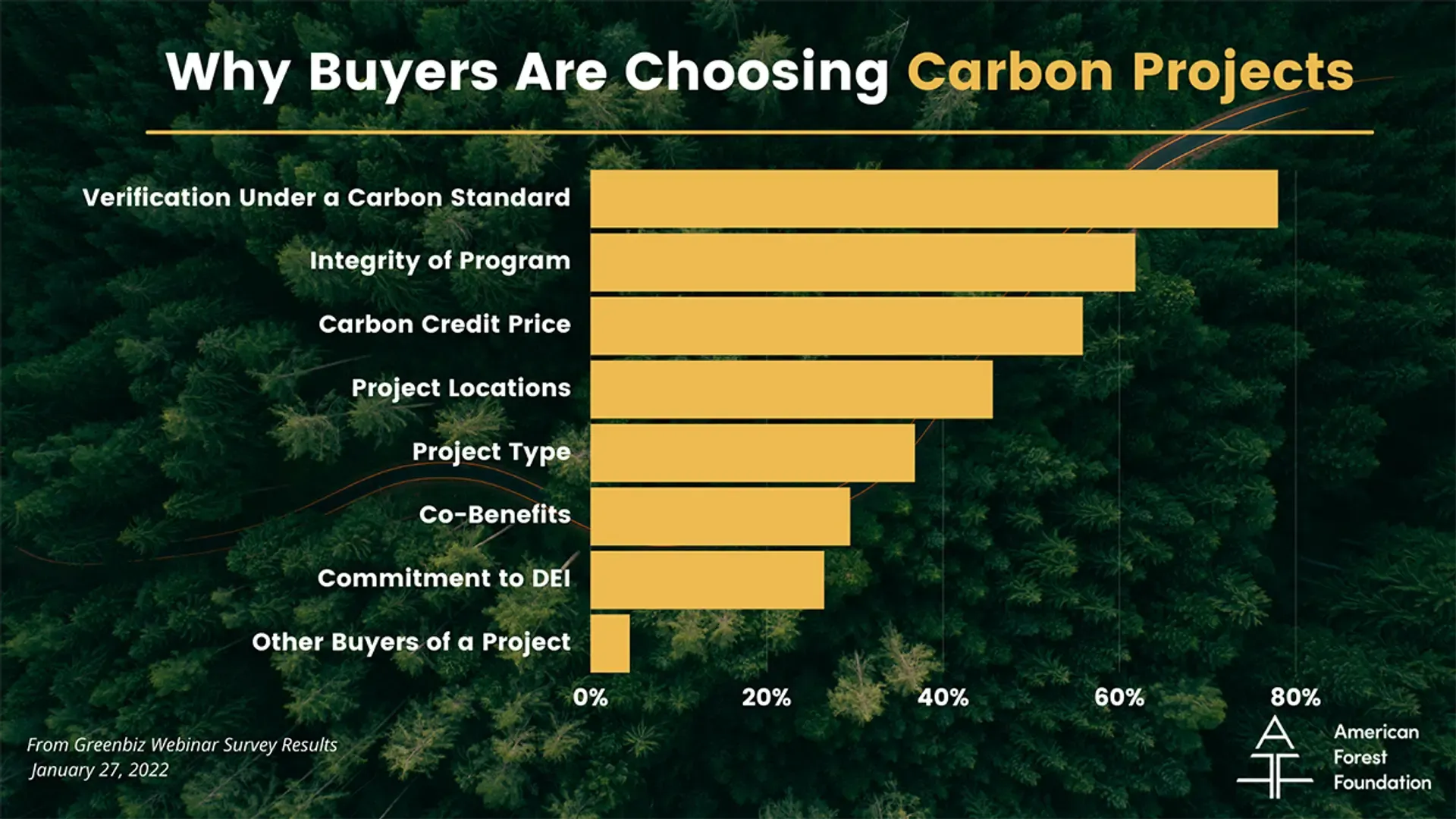10 Common Questions About Our Carbon Credit Buyers

Representatives from some of FFCP corporate partners and members of the American Forest Foundation's staff pose for a photo at a FFCP Partners’ Retreat in Vermont.
Selling carbon credits is what allows us to offer landowners benefits and incentives to care for their woodlands. But what happens once the carbon sequestered is transferred to carbon credits? Who is it sold to? For many landowners who are passionate about their woods and the planet, it's important to know their participation in the Family Forest Carbon Program is not only helping their own forest, but doing good for the larger natural world.
We’re proud to say we’re leading the industry when it comes to accurately measuring carbon impact, and that we carefully vet the companies we work with to ensure they are actively working to reduce their emissions in other ways before purchasing carbon credits.
To help family forest owners understand who is purchasing the carbon sequestered on their land, we asked Memorie English, Senior Manager of Environmental Markets here at the American Forest Foundation, to weigh in on some of the most asked questions about our corporate buyers and the credits they purchase.
1. Why are companies interested in buying carbon credits?
The world is becoming more unified and committed to climate progress. As a result, companies everywhere are feeling the effects of the rising “cost” of carbon emissions. While offsetting their emissions is technically voluntary for most companies, consumer pressure holds corporations accountable to their emissions while investors and other stakeholders are increasingly demanding that companies take action to mitigate their impact on climate change.
But companies are facing the reality that the technology often does not yet exist to eliminate their emissions entirely, and where it does exist, it is extremely expensive.
As a result, many turn to carbon markets to compensate for the emissions they aren't yet able to reduce, allowing them to meet their net-zero commitments.

FFCP corporate partners and some of the American Forest Foundation's staff gather on woodland owner Tim Stout's property in Rutland County, Vermont.
2. How does FFCP vet our carbon credit buyers?
A key part of our corporate engagement process is a policy that outlines the criteria a company must meet in order to work with the Family Forest Carbon Program.
This policy ensures our corporate buyers are aligned with our mission, vision and values, and helps us manage the reputational risk around the claim that our credits are producing real climate benefit.
Specifically, the policy includes taking the following steps when vetting a potential corporate buyer:
Review several third-party assessments, ratings and scorings such as Sustainalytics, and CDP (Carbon Disclosure Project) Score;
Consider the company’s direct conservation impact and whether the business has an impact specifically on family forest owners;
Confirm they are aligned with accepted international sustainability standards and have high standards for ESG (Environmental, Social and Governance) reporting;
Look at their commitment to Diversity, Equity and Inclusion (DEI) within their value chains.
This research is collected and brought before a committee (which includes members of the executive team of the American Forest Foundation) for consideration.
3. Don’t carbon offsets just give corporations an excuse to keep polluting?
Many landowners worry that by participating in the voluntary carbon market they are essentially enabling and condoning corporate polluting.
However, to purchase carbon credits from the Family Forest Carbon Program, corporations must adhere to the internationally accepted climate mitigation hierarchy shown below. This hierarchy is verified during the vetting process outlined above and ensures that the purchase of carbon credits generated by our program are a last resort to address any remaining emissions a company cannot eliminate.

For more information on this topic we recommend this article where we use a simple illustration to demonstrate the power of carbon markets to achieve greater impact with fewer resources, and this article where we outline the various ways the Family Forest Carbon Program ensures high integrity offsets.
4. Which companies have already bought our credits?
As of June 2023, we have partnered with the following companies on addressing their climate impact: REI, Amazon, Disney, Netflix, Dominion Energy, Link Logistics, Bank of America and Grove Collaborative.
5. How many credits can FFCP sell to each corporation? Is there a limit?
There is no limit on the number of credits a company can purchase, provided the Family Forest Carbon Program has the inventory to supply them. The minimum commitment we require of our corporate partners is 100,000 tonnes of carbon. However, most buyers are purchasing well above this amount. We also require a partnership agreement of between five and 20 years.
6. Is there a higher demand for higher quality credits?
Yes! There is higher demand for high quality carbon credits and there is a willingness to pay a premium for higher quality credits like those produced by the Family Forest Carbon Program.
7. Can the landowner pick who their credits go to?
While landowners cannot select the company that purchases the carbon credits generated by their land, we commit to being transparent about who our buyers are, why they support us, and how they are using the credits purchased.
8. Have we sold carbon credits to local businesses in the landowner’s area?
To date, each of our buyers has a national or international footprint, however regionality is very important to them. In other words, they chose to work with the Family Forest Carbon Program partly out of a desire to support the landowners and economies in the communities in which they do business. Some companies, like Bank of America and REI, have offered to share information and connect their customers to the opportunities offered by the Family Forest Carbon Program.
9. Do we sell credits internationally or plan to?
Companies do not need to be based in the United States to purchase FFCP credits. Because climate change is a global problem requiring "all hands on deck" to make meaningful change, our credits are available worldwide, while simultaneously supporting American family forests.
10. What do buyers look for in a carbon program? Why do they choose FFCP?

Quality & Integrity: We generate high-quality, third-party verified carbon credits. The additionality that our methodology provides, as well as our strong permanence and leakage strategy, are attractive to buyers because it is clear the carbon benefit is attributed to the improved forest management practices implemented by enrolled landowners.
Co-benefits: The co-benefits of FFCP practices (increased biodiversity, improved water quality, support of rural communities and minority landowners, etc.) are important as well, and help many companies to achieve other sustainability and DEI goals.
Risk Tolerance & Portfolio Variability: Despite the uncertainties associated with using a methodology as innovative that of ours, our corporate buyers believe in the mission and the vision of FFCP and want to make catalytic investments in the program to see it succeed. For some companies, FFCP is a piece of a larger carbon offsetting strategy (they may be purchasing from other projects at higher volumes and lower prices,) but FFCP is an important part of their project portfolio that leads to higher-quality credits and innovation in the project development space.
Partnerships: Some of our buyers appreciate the ability to partner with a program beyond the transactional relationship of contracting for carbon offsets. We have worked with several companies to date on additional philanthropic contributions, as well as partnering on marketing and communications efforts to increase the visibility and reach of the program in key areas.
The Family Forest Carbon Program is now enrolling landowners with 30 acres or more in Pennsylvania, West Virginia and Vermont, as well as select counties in Maryland, Massachusetts, Michigan, Minnesota, New York and Wisconsin. Click here to check your eligibility today.
Related Articles

April 14, 2023
What We Pay and Why It's Not For Carbon
The Family Forest Carbon Program is about more than monetary payments. The benefits include a better forest to enjoy for you and future generations. But how is the value of your payments determined, how are they funded and what are those payments for? Let's explore this unique program's financial benefits.

June 6, 2023
Carbon Program Helps Remove Invasive Species, Cover Property Tax for Pennsylvania Landowner
Susan Benedict was thrilled to inherit the 2,000 acres of forest land that has been in her family for several generations, but affording the maintenance and management of the property quickly became a challenge.

April 28, 2023
Carbon Markets 101
When we say we are selling “carbon," we’re not speaking literally. We don’t come to your property and extract a tonne of carbon, the element, put it in a box and ship it to a corporation. What we’re really selling is a claim — specifically, the claim that a tonne of carbon dioxide has been kept out of the atmosphere as a result of a specific action — in this case, a carbon program.